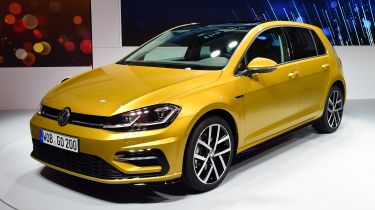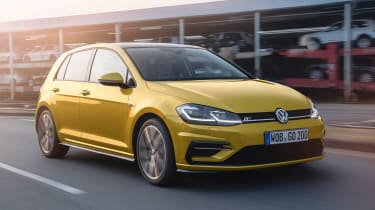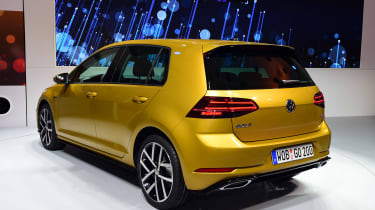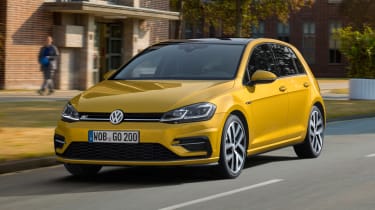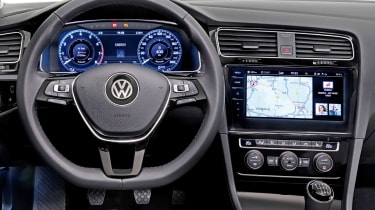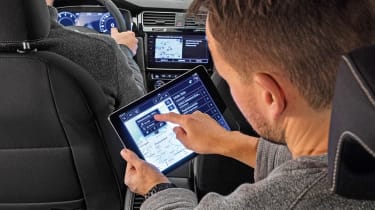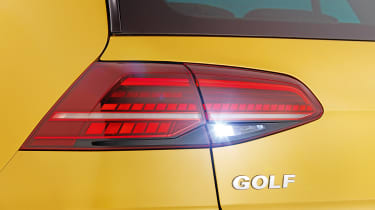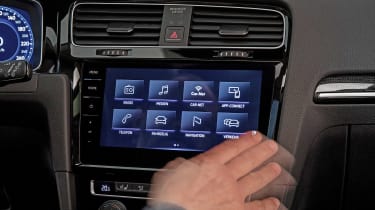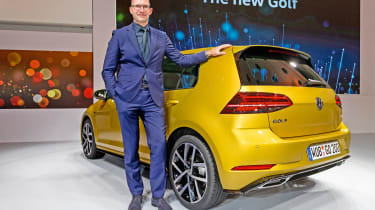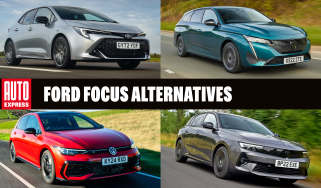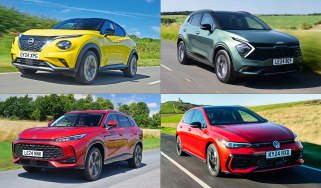New 2017 VW Golf: prices and specs announced
New Mk7.5 Volkswagen Golf on the way, with revised engines and significant tech upgrades but its costs less than the old one
A new Volkswagen Golf is coming this year, and it’s big news given that the hatch was the fourth most popular new car in the UK in 2016. The latest model isn’t an all-new version, though, with the company branding the updated Golf the Mk7.5 instead of the full-spec Mk8. It will go on sale in early 2017, and prices and specifications have been announced.
The new Volkswagen Golf Mk7.5 will cost an average of £650 less than the generation it replaces, it has been announced - despite ushering in higher levels of safety equipment and VW’s latest infotainment systems.
• Best hatchbacks on sale right now
The entry point for the stalwart of the family car market will remain the same, at £17,625 for a VW Golf three-door 1.0-litre three-cylinder petrol edition, producing 84bhp and offered in S trim. Even this model will get the updates that are being introduced on more expensive Golfs, though, with LED tail-lights as standard and a 8in colour touchscreen infotainment system instead of the old 6in set-up. It’ll also bring air-con and LED daytime running lights.
The middle ground of the range will be SE and SE Nav editions, which start with 109bhp versions of the same three-cylinder engine. Indeed, a five-door SE with the 1.0 and a seven-speed DSG automatic gearbox emits 107g/km - a strong figure for a petrol family car. VW hasn’t confirmed final specs but SE is expected to include pedestrian monitoring and city emergency braking, parking assistance, alloy wheels and a leather-trimmed steering wheel - plus a central infotainment screen that’s now eight inches across instead of six.
A 1.4-litre five-door SE, with 123bhp and CO2 emissions of 120g/km will cost £20,070, while adding navigation to the same spec takes that figure up to £20,820. The range-topping infotainment system, called Discover Pro, gets a 9.2-inch display with higher resolution than before - and it can also be controlled by hand gestures in front of the screen.
The cheapest diesel in the new Golf line-up will be the 114bhp 1.6 TDI, which costs £19,770 in S trim as a three-door or £20,425 as a five-door.
The three higher-performance models will be the GTD - which gets a 181bhp 2.0-litre diesel and is offered in three-door, five-door and estate bodystyles - along with the revised GTI and R. The GTI (three- and five-door only) gets a power hike to take it to the same 227bhp as the existing GTI Performance; it costs from £27,865. The R, meanwhile, also gets a slight power boost to 308bhp.
VW has not announced prices for engines that are due on sale in late spring - including arguably the most significant unit of all, a 1.5-litre turbocharged petrol that will be offered with outputs of either 148bhp or, in more eco-focused spec, 129bhp. However, Auto Express understands that this motor will only be offered on mid-range models and up, at least initially, so the cheapest 1.5 TSI Evo is likely to be in SE spec, where it should cost around £20,000.
The first wave of new Golfs is on sale now, although the 1.0 models are not available to order until March.
VW Golf Mk7.5: key changes
While the majority of the styling and underpinnings remain the same, there are significant changes to the interior, infotainment and on-board technology to mark out the new model as a big leap over the outgoing Mk7.
In particular, the Golf gets noticeable upgrades in its infotainment system. It will now be offered across the range with the option of ‘Active Info Display’ - the same digital instrument panel that we’ve already seen on various Audis and Volkswagen’s own Passat.
Every Golf will get a colour central dashboard screen of at least 6.5 inches in size, and the resolution of that display is double that of the most basic (black and white) system in the existing car. Meanwhile, the existing 6.5-inch screen-based systems move up to eight inches and the range-topping Discover Pro set-up grows from eight inches to 9.2 inches, and from 800x480 pixels to 1280x640 pixels.
Other upgrades in connectivity include a wireless charging facility for compatible smartphones, an interface that allows phones and tablets to connect to the car and control its infotainment system away from the dashboard (from the rear seats, for example), and a series of new apps that sit alongside Apple CarPlay and Android Auto.
Rollout of the new Golf is beginning in Europe, with order books for the facelifted version of the GTE Hybrid and GTD diesel hot hatch opening in Germany.
2017 Volkswagen Golf engine range
The engine line-up gets a rejig, and a new arrival in the shape of a 1.5-litre turbocharged petrol producing 148bhp. This unit is the second in the history of the Golf to be offered with Active Cylinder Management, technology that allows it to shut down cylinders to save fuel when the car is cruising. VW also says an eco-focused version of the same engine, with Bluemotion badging and a more modest output of 129bhp, is under development.
At the top of the Golf range, meanwhile, the GTI hot hatchback gets a revised engine with more power. The ‘regular’ GTI now produces 227bhp, while the Performance edition moves up to 241bhp. The GTD gets the same powerplant as before in the form of a 181bhp turbodiesel 2.0-litre.
The final mechanical tweak comes in the gearbox line-up, where VW has announced that it plans to phase out the six-speed dual-clutch DSG transmission across the range and replace it with a seven-speed unit.
While the Golf facelift does introduce some powertrain revisions, the hybrid system underpinning the revised Golf GTE remains the same, being a 1.4-litre TSI petrol engine with 148bhp mated to a 101bhp electric motor, with total power output coming in at 201bhp.
All-electric range remains at 31 miles, and the 7.6 second 0-62mph time should remain exactly the same, so the GTE only gets minor new styling tweaks and new infotainment options.
2017 Volkswagen Golf design changes
VW rarely gets radical with the Golf’s looks, so this mid-life face-lift brings only a mild rethink on styling. There are tweaks to the front-end design, with the option of LED headlights and different air intakes in the lower bumper. At the rear, every Golf will now get LED tail-lights as standard, and higher-end editions will feature animated ‘flowing’ indicators.
Inside, there are new patterns of seat covers, plus new materials in the dashboard, door panels and centre console. Cabin space and boot capacities will remain unchanged, because the car and its wheelbase haven’t grown at all.
The revised Golf models - three-door, five-door, GT, GTI, GTE and estate - are due to go on UK sale in February, with first deliveries starting in April. VW hasn’t announced any prices yet but we’d expect at worst a small increase over the existing car; that would give the entry-level three-door hatchback a figure of around £18,000.
2017 Volkswagen Golf tech secrets
Assistance tech
A huge addition beneath the lightly revised surface of the new Golf Mk7.5 is the suite of driver assistance features, including new semi-autonomous driving modes which are bound to appear on new premium VWs like the flagship Arteon saloon later this year.
Traffic Jam Assist is the big new development; this combines lane assist features with automatic distance control to take over from the driver in dense traffic and long queues. It also forms the basis of Emergency Assist, which warns drivers if they’ve dozed off; this brings the car to a halt if whoever is at the wheel is unresponsive.
Media Control
The Media Control function is an interesting new feature, and is likely to grace any new VW equipped with the new Discover Media or Discover Pro infotainment set-up.
It’s an app, downloadable for tablets and smartphones, and used to control many of the infotainment settings once connected via the car’s built-in WiFi hotspot.
Media Control is a mobile extension of the Golf’s infotainment set-up created with rear seat passengers in mind, but it also expands functionality – especially in terms of navigation. In sat-nav mode it supplants the standard screen with an easy-to-use address search.
LED tail-lights and animated indicators
If the Golf Mk7.5’s makeover seems a little too subtle for your liking, take a closer look at the new lighting technology VW is introducing on the new car.
While LED headlamps will be an option, full LED tail-lights will come as standard on every single model. A premium pair of the new rear lights will be available as an optional extra or as standard on high-spec models, too, introducing animated indicators and brake lights. Expect the premium lighting to appear on VW’s all-new flagship Arteon when it arrives later this year.
Discover Pro Infotainment
The Golf facelift introduces significant changes to the infotainment package, with new designs, larger screen sizes and fresh technology. The standard touchscreen size has been increased to 6.5 inches and is now in full colour.
A new eight-inch size has been introduced above it, but most of the revisions come with the top-of-the-range Discover Pro package. It introduces gesture control; a built-in proximity sensor means you’ll be able to wave your way through the menus without touching the screen. VW says the tech is coming to more cars, and with the Polo switching to the MQB architecture, expect the set-up to trickle down as well as up.
VW Golf will have 'real world' efficiency figures
The new Golf will bring efficiency gains across its engine range - but the official figures for the car may only show a slight improvement as VW tries to produce data that can be matched in the real world.
VW’s head of development, Dr Frank Welsch, told Auto Express that his engineers would not be “pushing the limits” of how the cars are tested for fuel efficiency - and that this should give customers a better idea of what they can achieve in regular driving.
“We have small improvements in the engines across the whole range,” said Welsch, “but as a result of the past year [Dieselgate], we changed the parameters and restrictions of our measurements on fuel consumption. We were all following these regulations - all manufacturers - but now we’ve made our tolerances even smaller so the results are closer to the real world.
“So while we have made gains everywhere - in powertrain, transmission, rolling resistance and aerodynamics - they may not be immediately obvious on paper because of this new approach. But when we say the new 1.5 engine uses up to a litre of fuel less per 100 kilometres, that’s real,” he said.
Q&A with Klaus Bischoff, design director
The man responsible for the design of the latest Golf – and its future evolution – spells out his vision for keeping the top seller fresh.
Q: What are some of the key design updates and why were they made?
A: “The Golf is a truly unique automotive icon. The new LED headlights are integrated much more smartly. Also, the cooling openings in the lower part of the bumper have been redesigned to accentuate the width of the car even more. The back of the car is more charismatic: from now on, all versions of the Golf will come with full LED tail-lights.”
Q: The Golf is a crucial car for the brand. Will this subtly updated model influence future VWs?
A: “As with every Volkswagen, the Golf has a pure and understandable design. This is what we have sharpened even more with the new car, and will continue to sharpen in future models. Typical design elements for example are the distinctive character line, the strong C-pillar and the emphasis on the width. These will also be characteristics for other new models.”
Q: The interior is arguably the biggest change – why focus on technology?
A: “Especially in the interior we focused on design and technology. We implemented new decorative trim panels in the doors, the dash panel and the centre console, as well as new seat covers. But most notably we aimed to improve the communication between car and driver. Together with our colleagues from electronic development, we worked out a new HMI design. You can see it in the new Active Info Display, or on the huge screen of our first infotainment system with gesture control in a Volkswagen.”
Q: Are there changes to the feel and quality of the car that we may not be able to see initially, but feel over time?
A: “If you ask me as a designer, I would answer that the overall design of the Golf is based on a timeless and worthy design language. You can feel that every day. But we also enhanced some new state-of-the-art technologies to improve the performance, as well as the long-term duration. Let me give you an example: the integration of the LED technology is a long-term quality and safety upgrade for the Golf.”
Q: Will the Golf remain competitive when the production version of the I.D. concept arrives?
A: “The Golf is one of the world’s biggest-selling cars – a whole class bears its name. And combustion engines will still play an important role for the next decades. That is why we are sure the I.D. and Golf must be part of our range at the same time to offer the best mobility solution for every customer.”
Q: Will the Golf Mk8 be a more radical overhaul?
A: “Every new Golf generation has set benchmarks in its age, and so will the next Golf. But please be sure: a Golf will always stay a Golf – unique and iconic.”
What do you think of the facelifted Volkswagen Golf? Let us know in the comments section below...
Find a car with the experts

